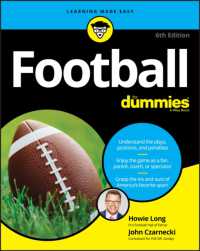- ホーム
- > 洋書
- > 英文書
- > Politics / International Relations
Full Description
This book examines racism and injustice in the United States through the eyes of those of African descent. Historically America has promoted itself as the moral police promoting democracy across the globe, offering her perspectives and ideas to combat poverty, and racial and ethnic violence. In the age of President Donald J. Trump, there has been a resurgence of racial and political violence in the United States, specifically as it relates to the treatment of ethnic minorities.
The rise of overt political racism and intolerance has made visible, for a global audience for the first time since the Civil Rights Movement, the deeply rooted systems of discrimination and identity-based conflicts in the United States, that gives rise to structural and direct violence. African Americans, like other minorities, find themselves in a unique position in this age as new forms of race lynching continue to go unchecked; voting rights continue to be suppressed; prisons continue to serve as a mechanism for disenfranchising minorities and the poor, (with more minorities being imprisoned in America than in South Africa at the height of Apartheid); and systems of structural violence continue to persist.
As the mantra- "Make America Great Again," a racist dog whistle, calls up memories of a "Great" time where white Americans felt more secure socially and politically.
In this post-truth society, discussions of racial equality and identity politics often shape the news and agendas in the United States. While many works examine the ways in which Americans examine the social, economic and political struggles that African Americans face, no current work specifically considers the peace-centered perspectives of marginalized voices on these struggles, from throughout the African Diaspora.
Contents
Foreword, Rev. Cannon Naomi Tutu
Introduction, Charles L. Chavis, Jr.
Part I: Racism: A Systemic Thing
1. Structural Violence Through the Lenses of Conflict Resolution and Reconciliation Comparative Case Study of America-South Africa Racial Politics, Siyabulela Mandela
2. Deconstructing the Origin and Myth of Black Criminality: Asserting Black Agency Over Black Lives and Black Communities, Wayne Rose
3. The Systemic Lynching of Trevyan Devon Rowe, Robert Hoggard
Part II: Knowing the Past: Narrative Change and the Historical Perspective
4. Segregation, White Supremacy, and the Dangers of Political Opportunism: A Case Study of George Wallace and Hendrik Verwoerd, Matthew Washington
5. I Leave You a Desire to Live Harmoniously: Mary McLeod Bethune on Health and Wellness, Ida Jones
6. From Birmingham to Monrovia: Black Women and the Wait/Weight of Freedom, 1960-2005, Ajanet Rountree
7. 'So Tried, So True:' The Legacy of Student Led Protests at Historically Black Colleges and Universities, Simone R. Barrett
8. Reparations and Reparations NOW! A Brief History of Compensatory Justice for the European Enslavement of Africans, Raymond Winbush
Part III: Africana Cultural and Religious Perspectives on Peace
9. Ritual Remembrance and Protest as Embodied Pedagogy and its Role in Solidarity, Courtney Bryant Prince
10. Race, Rituals of Dissent, and Blackness in America, Oluwagbemiga Dasylva
11. For Renewal: Faith in the Fight for Dignity and Human Rights, Sandra Tombe
12. Carcasses of Memory: Intersectionality, Institutionalized Terrorism, and the Play on Black Bodies in America, David Olali







